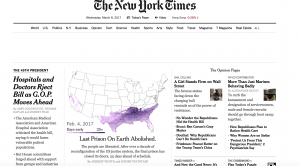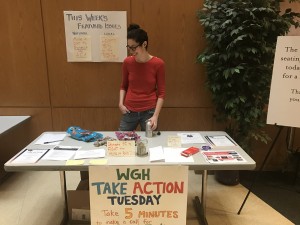Rachel is currently pursuing a Masters in Public Health at the Harvard Chan School of Public Health. She can be found in the Kresge atrium on any given Tuesday, around 12:30 encouraging faculty, students, and staff to contribute their time, money or phone calls to collective action challenging the current political environment. During these weekly events, which have been dubbed “Take Action Tuesdays” by the Women Gender and Health (WGH) concentration that endorses them, Rachel and others have handed out flyers with talking points, empowering colleagues to communicate with their representatives about the ACA repeal, cabinet appointments and more. They have made valentines and raised money for the Islamic Society of Boston. Thanks for your reminder that creating the world we envision begins when a few people begin to work collectively! Click here to see the scripts and log your own phone calls!
Rachel and I sat down to discuss her current and prior experiences with organized action as well as her vision for the future. A portion of our interview is transcribed below.
Organizing is inherently dependent on relationships and building those takes time and requires a level of commitment to the space and place that you are in.
S: Tell us about some of the work you’ve been a part of
R: Before coming to school here I was in Providence and I helped start up the White Noise Collective, which is trying to mobilize white folks around issues of racial justice. Around the same time, I was doing organizing work with a group called Direct Action for Rights and Equality (DARE). They will tell you they were before the drug DARE!
S: Ok, because I have some T-shirts!…
R: I know because I have some t-shirts too and I always say the one for equality, not the drug one!
R: But DARE has a couple things they do and one is Behind The Walls which works with formerly incarcerated folks and their family members around issues trying to abolish the prison industrial complex or at least trying to make it more humane while it does exist. And so we were working on a campaign to increase access to public housing for people with criminal records and I was pretty intensely involved with that for about two years.
R: As an undergrad I was involved in the climate activism, the divestment movement, trying to get my university…Brown, to divest from coal and I’ve done some climate related work. Those are some of the big pushes I’ve ben involved in.
S: I can see some clear correlates between what you’ve done in Providence and what you are doing here in Boston. Can you talk more about that?
R: So since getting to Boston, I have not been regularly a part of groups in the way I was in Providence. And much of that is because of my organizing principles; I guess you could call them. I see organizing as different from activism because organizing is inherently dependent on relationships and building those takes time and requires a level of commitment to space and place that you are in. Since moving to Boston, I wasn’t sure if I could commit in the same way. But, I’ve been involved with the SURJ chapter here (Showing Up for Racial Justice). I go to their large meetings every month and try to do the actions they plug us into.
I tried to help out organize a group of students at the public health school to support the Harvard dining hall workers strike. So that was a brief but intense period of organizing. And more recently have been helping to organize the Take Action Tuesdays as places for folks to come make phone calls write letters to representatives and donate money to grass roots organizations that are protecting civil and human rights. Just that having a consistent space for students who are feeling overwhelmed and saying here is one phone call you can make today. We thought that might be helpful.
—More of our conversation can be found on the audio linked, we talk about the 40,000 or so Massachusetts drug charges made based on falsified lab evidence; competing motivations and ego as a grad student and activist, JP ROX!/Keep it 100 for Egelston and MORE—-
The Future
You’re day-to-day shouldn’t make you feel as if you are complicit in all sorts of injustices you don’t want to be a part of.
S: What does the future that you are working towards for 2040 look like.
R: Meaningful increasing in two things:
1. Meaningful participation of people who don’t actively see themselves as activists. And I think we are seeing that more and more of that now. Honestly, I just want it to look like the 60’s. I mean the numbers we get excited about for protest nowadays are nothing in comparison to the then, just to think of the sheer scale of people who were in motion is amazing. I would want just average everyday folks to feel like organizing, and activism is a regular part of their everyday life and is a large part of what how they gain meaning.
2. The other is an increase in the interconnectivity of people working on different movements. Kimberly Crenshaw said intersectionality how ever many years ago and now it’s almost mainstream! And whether any of us has a grip on the vast black feminist literature that discusses intersectionality is something else. But it says something that there is even a recognition of… The recent identity movements have been incredibly powerful and I think will be more powerful when they are all working together to organize. And that is what I want to see. Because activism is whre you feel committed to people. And if we can support each other’s actions and work together…that is what I am envisioning.
S. What are we working together towards?
R. We are working towards a world where you have guaranteed income, and borders don’t exist and prisons don’t exist. We’ll recognize that there are people who should be treated for mental illness and that the prisons don’t make us safe. They tear families apart. Guns don’t make us safe; police with guns don’t make us safe. Universal health care, getting rid of fossil fuels, free education. I mean, I guess my ideas are pretty radical but…I don’t want to just change the way we do things…You’re day-to-day shouldn’t make you feel as if you are complicit in all sorts of injustices you don’t want to be a part of.

